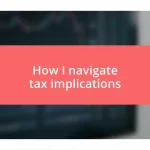Key takeaways:
- Understanding tax implications, including capital gains and deductions, is crucial for effective financial management and can avoid unexpected tax bills.
- Identifying personal tax situations requires assessing all income sources, filing status, and eligible credits to optimize tax strategy.
- Consulting tax professionals and utilizing tax software can simplify the filing process and uncover potential savings, enhancing overall financial confidence.
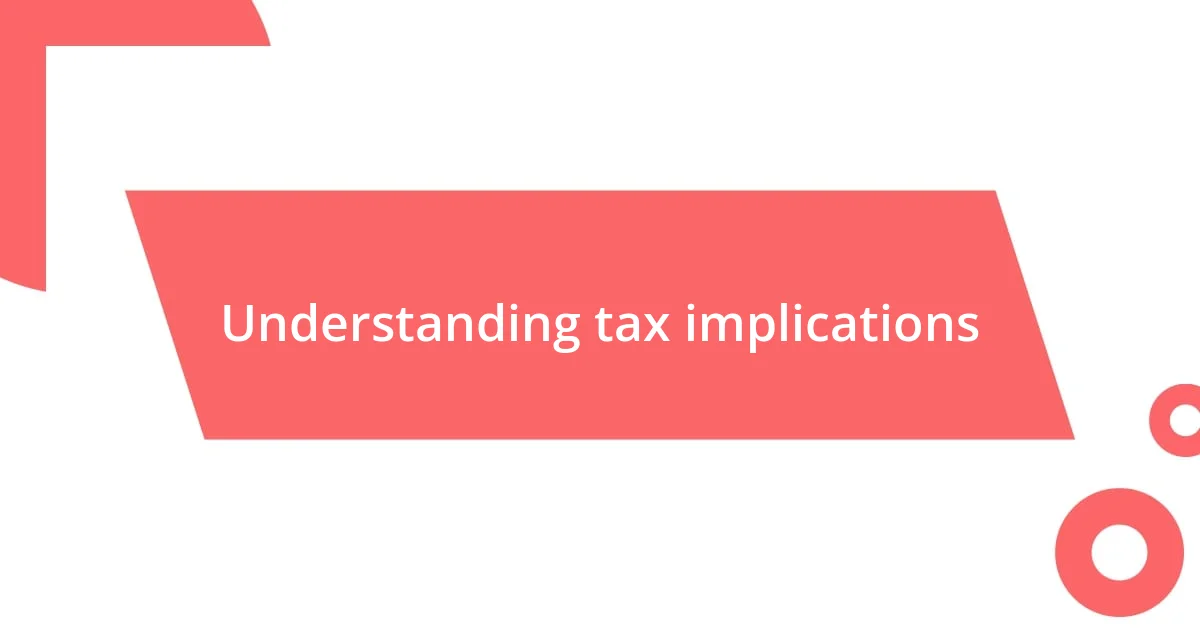
Understanding tax implications
Understanding tax implications is all about grasping how your financial decisions can influence what you owe to the government. For instance, I remember the first time I sold stocks; I was so excited about the profit that I didn’t consider the capital gains tax. Why didn’t I? It felt overwhelming, like navigating a maze, and I learned quickly that being informed is key to avoiding unpleasant surprises.
When you think about tax implications, it’s crucial to assess how an investment or financial move affects your overall tax liability. I once took a leap and decided to freelance on the side, but what I didn’t fully account for was how that extra income bumped me into a higher tax bracket. It made me realize that understanding the tax structure could mean the difference between growing my business and facing a hefty tax bill.
Have you ever considered how tax deductions can shape your financial health? I had no idea how powerful deductions could be until I spoke with a tax advisor who helped me identify eligible expenses. Suddenly, it wasn’t just about what I owed; it became about strategizing to minimize that amount. It was a game-changer, highlighting why understanding tax implications is an empowering step in managing one’s finances effectively.
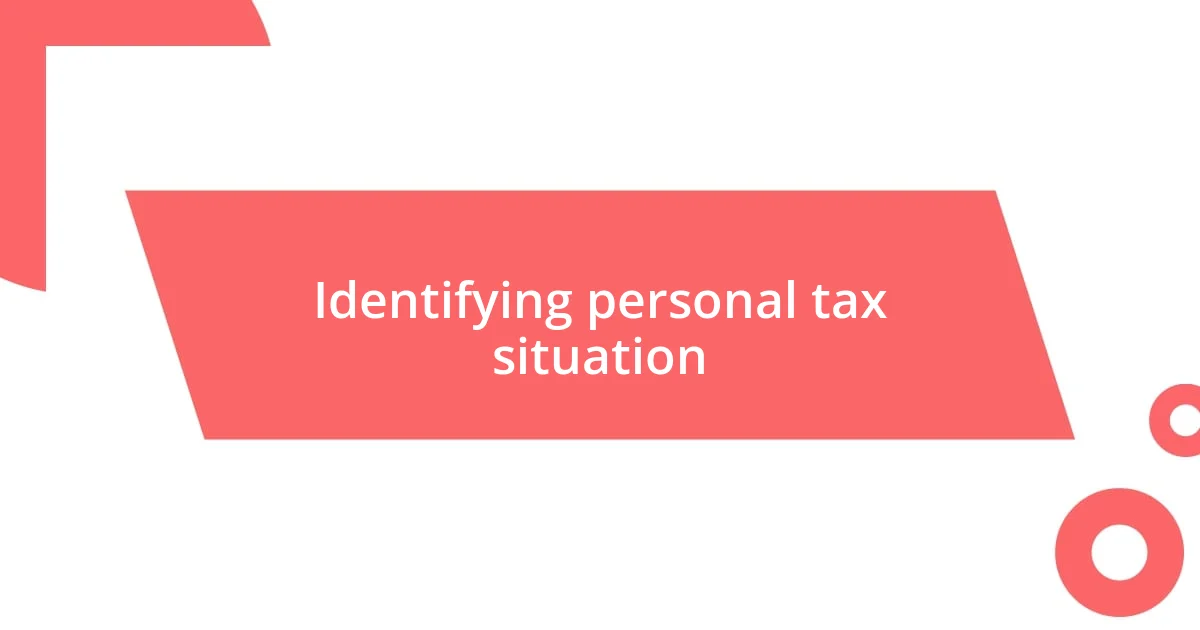
Identifying personal tax situation
Identifying your personal tax situation begins with a comprehensive view of your income sources. I recall when I started tracking my income more diligently; it revealed nuances in my earnings that I hadn’t considered before, like gig work or investment income. Each source varied in tax implications, and recognizing them was a pivotal moment that shaped my record-keeping habits.
- Assess all income sources: salary, freelance work, dividends, etc.
- Keep meticulous records to track deduction eligibility.
- Understand tax brackets and how income impacts them.
- Consider filing status: single, married, head of household, etc.
- Evaluate any potential credits that may apply to your situation.
For a deeper understanding, reflecting on your major financial decisions is vital. After I bought my first home, my tax situation changed dramatically, thanks to mortgage interest deductions. It felt enlightening to connect these dots, allowing me to strategize for upcoming tax years and ultimately feel more confident in my financial planning. Take time to analyze how life events, like marriage or a new job, influence your tax responsibilities, as this can provide clarity in your financial journey.
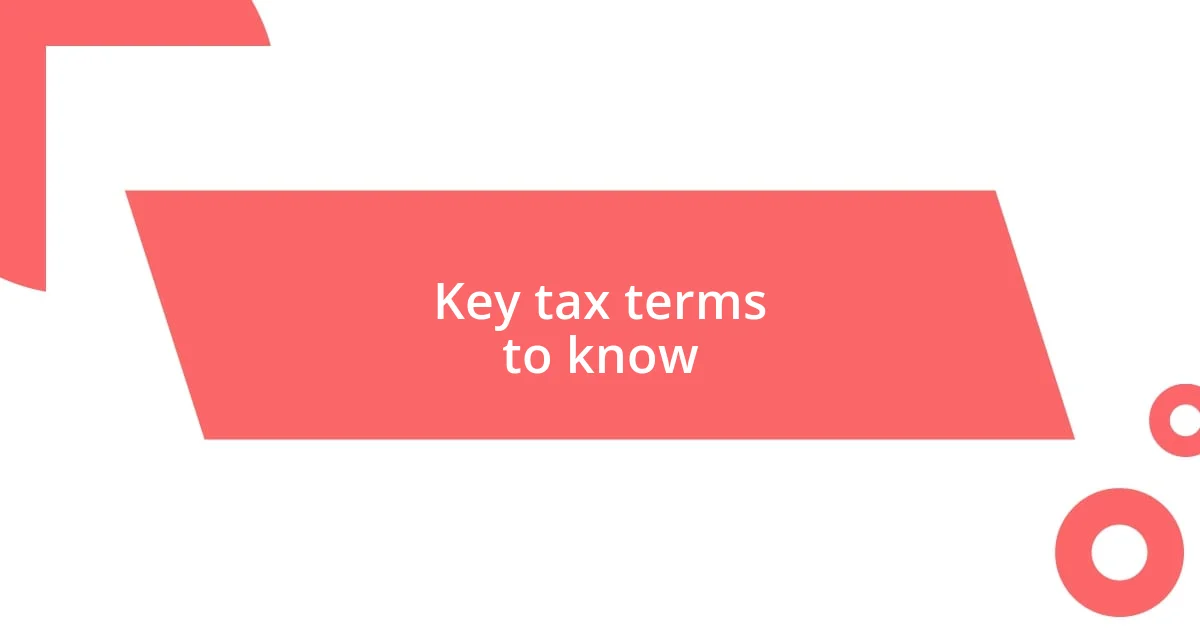
Key tax terms to know
Understanding key tax terms is essential for navigating the complexities of your tax situation. I remember the first time I encountered the term “deduction.” It felt like a light bulb went off. Deductions can significantly lower your taxable income, and realizing they exist was a game-changer for my tax strategy. Knowing the difference between a deduction and a credit can save you a lot of money, so don’t overlook these basics.
Another critical term is “taxable income,” which refers to the income that is subject to tax after all deductions and exemptions. I once underestimated how my investment income impacted my taxable income, which led to a higher tax bill than expected. By understanding how to calculate it, I was able to plan better for future earnings and avoid unwelcome surprises.
Finally, understanding “capital gains tax” is vital, especially if you’re dabbling in investments like stocks or real estate. The first time I sold a property, I was thrilled about my profit until I learned about the taxes on those gains. I found myself wishing I had researched this term earlier. It’s those little blindsides that can turn into learning experiences, teaching you the importance of being informed about terms that directly impact your finances.
| Term | Definition |
|---|---|
| Deductions | Expenses that reduce taxable income. |
| Taxable Income | Income subject to tax after deductions and exemptions. |
| Capital Gains Tax | Tax on the profit from selling an asset. |
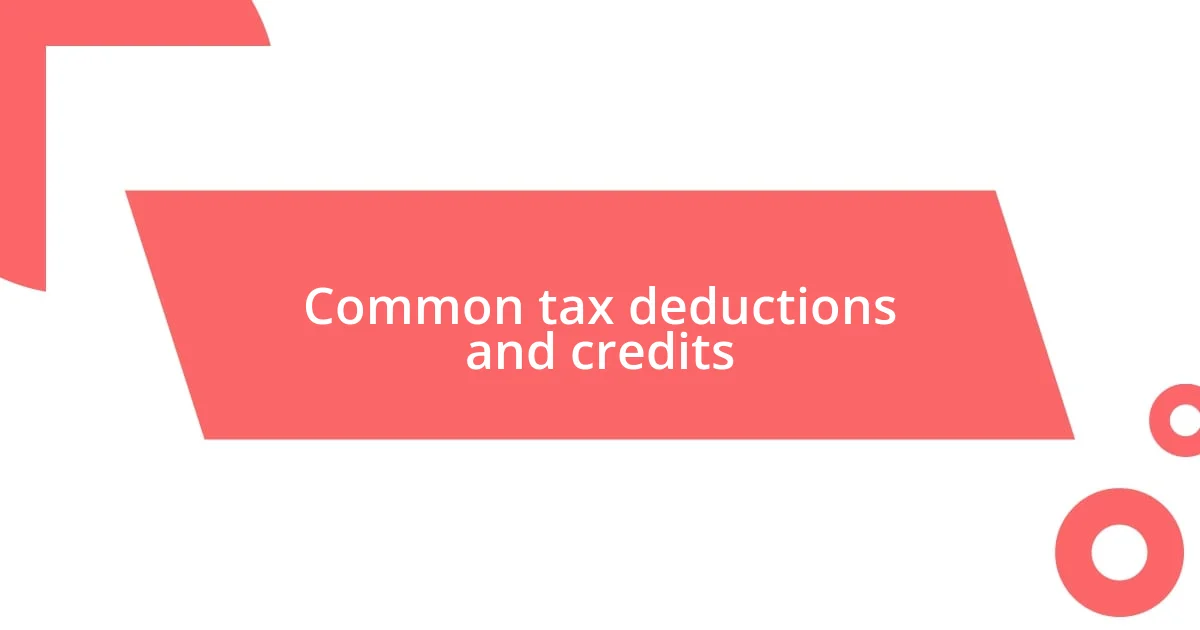
Common tax deductions and credits
When dipping into tax deductions, one that stands out for many is the student loan interest deduction. I remember when I was making my first payments, feeling overwhelmed by the financial weight. Discovering I could deduct up to $2,500 of interest paid on my student loans offered a refreshing relief. It made me realize that understanding your eligibility for such deductions can genuinely ease financial burdens.
Moving on to tax credits, one that often gets overlooked is the Earned Income Tax Credit (EITC). I once had a friend who was hesitant about filing because she thought her income was too low to qualify. However, after a little research, she discovered she was eligible and received a substantial refund. This experience taught me the importance of knowing which credits are available, as they can be transformative for your refund situation.
Lastly, let’s not forget about healthcare credits, particularly the Premium Tax Credit. When I transitioned to a self-employed status, I was shocked at how my insurance costs surged. Thankfully, the Premium Tax Credit helped to offset those expenses, easing my financial stress. It’s fascinating how being mindful of these credits can genuinely reshape your financial outlook. Have you checked what might apply to your situation?
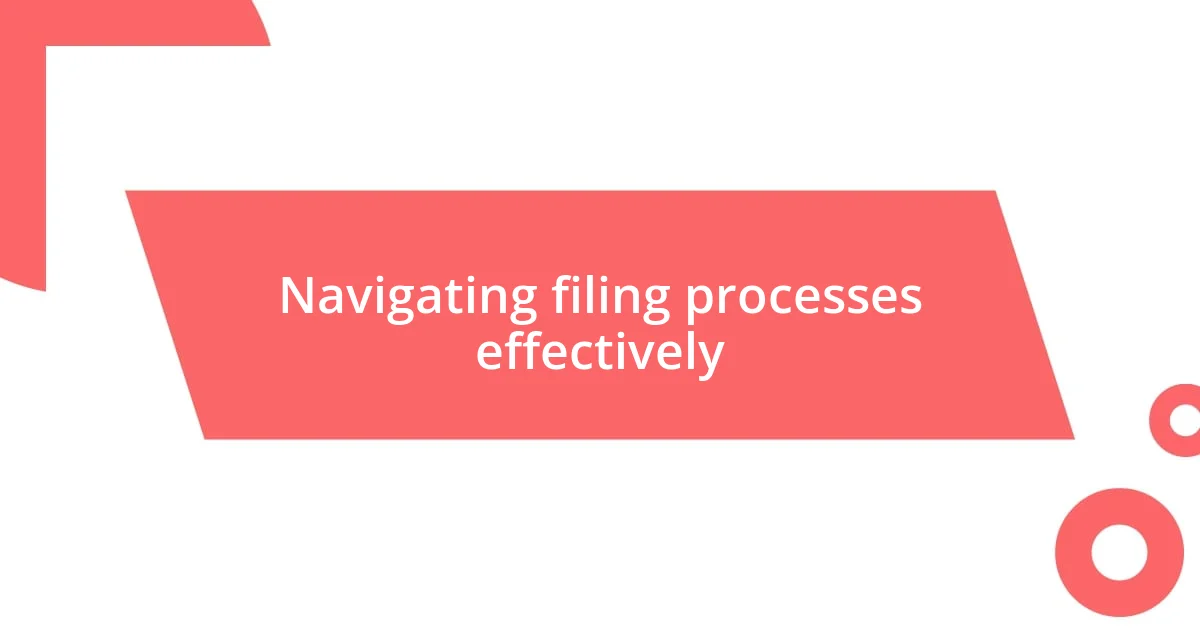
Navigating filing processes effectively
When it comes to effectively navigating the filing processes, I’ve learned that organization is your best friend. The first time I gathered my tax documents, I felt like I was in a scavenger hunt, tracking down W-2s and 1099s. Now, I create a checklist of everything I need and go through it systematically, which makes the filing feel much less daunting. How much easier could your experience become with a simple list?
Establishing a clear timeline is another crucial step. I remember procrastinating and leaving my filing until the very last moment one year. The stress led to mistakes that cost me time and money. Now, I set a personal deadline a few weeks before the actual tax deadline. This way, I have ample time to review everything and ensure all details are accurate. How would it feel to approach tax time with confidence instead of dread?
Consulting a tax professional can also be a game-changer, especially if you have a complex situation. On my journey, there were times I felt overwhelmed by the options available for deductions and credits. When I finally decided to work with an expert, it was a revelation. They not only helped me maximize my refund but also educated me on strategies I could implement for future filings. Have you ever considered how a little guidance could completely transform your tax experience?
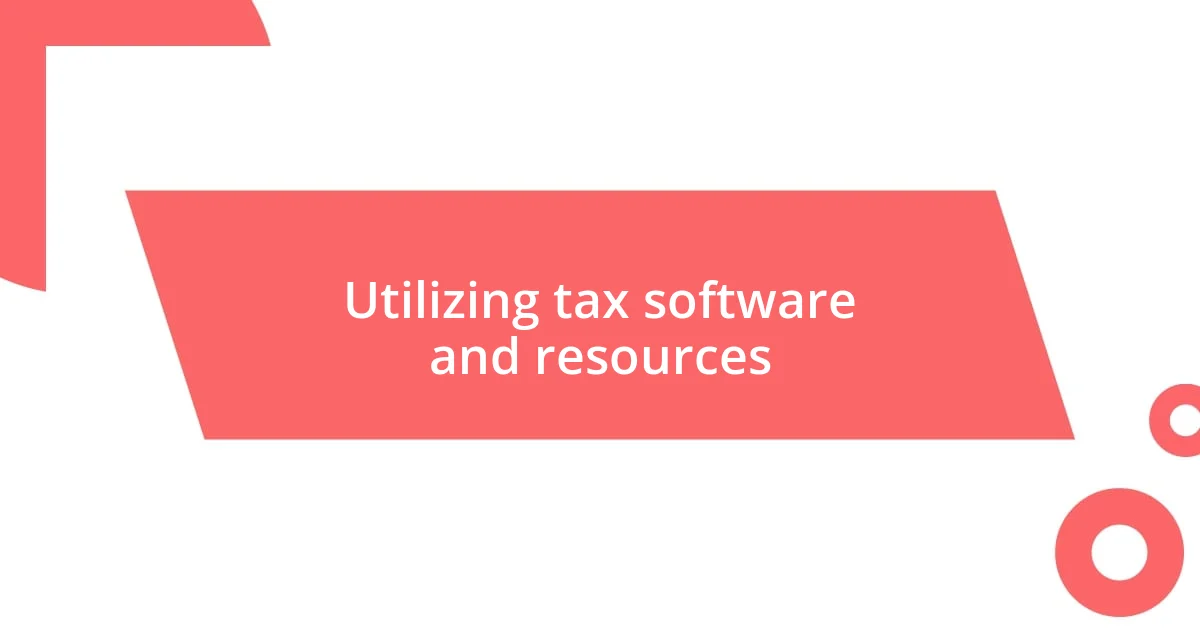
Utilizing tax software and resources
Utilizing tax software has been a game-changer for me. I still remember the first time I decided to try an online platform instead of going through the manual filing process. The interface was user-friendly and walked me through each step, making what felt like an intimidating task surprisingly simple. It’s interesting how technology can break down barriers, isn’t it?
I’ve also discovered that many tax software options offer integrated resources that explain deductions and credits in real-time. The first time I encountered this feature, I was filing and came across a question about business expenses. With just a click, I found detailed examples that helped me realize I could deduct supplies I had purchased for a side project. Have you ever experienced that “aha!” moment when software clarifies something you didn’t even know was an option?
Additionally, utilizing online forums and community resources can enhance your tax knowledge immensely. I often find myself browsing through Reddit threads or dedicated financial forums where people share their experiences and strategies. One particular thread highlighted a little-known state tax credit that I had never considered before. Engaging in these discussions not only provides valuable information but also creates a sense of community around a topic many find daunting. How reassuring is it to know you’re not alone in navigating this complex landscape?
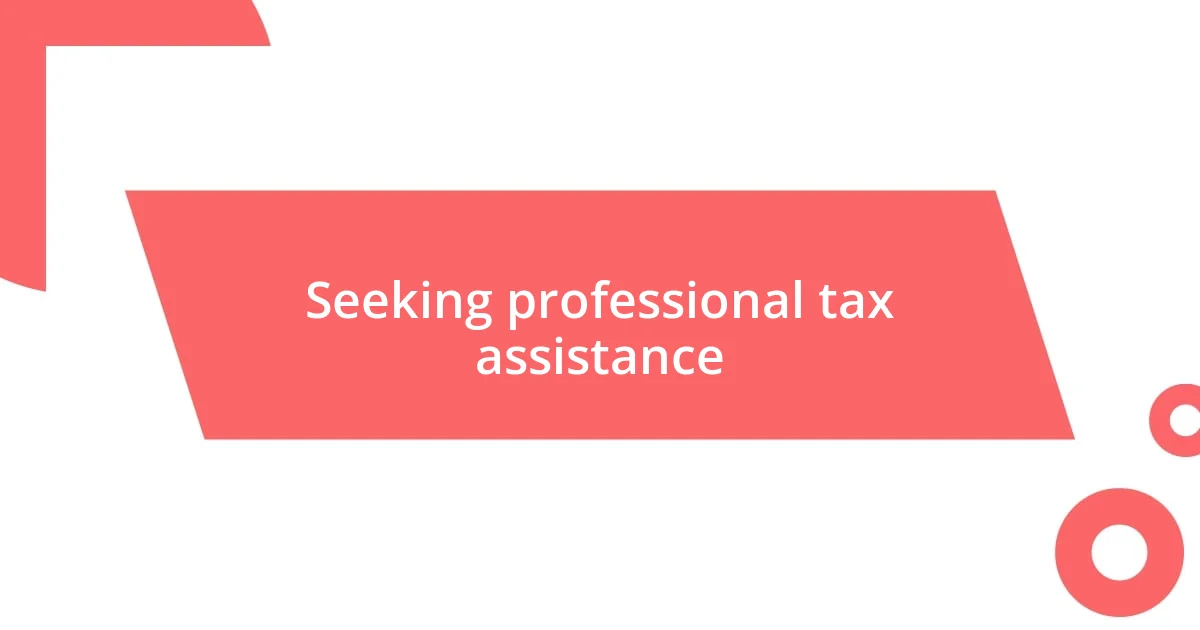
Seeking professional tax assistance
Seeking professional tax assistance can truly enhance your overall experience. I remember a time when my attempts at DIY tax filing left me feeling frustrated and confused. The moment I decided to consult a tax advisor felt like a weight was lifted off my shoulders. Suddenly, I had someone who could navigate the intricate tax codes for me, making everything feel less overwhelming. Can you imagine having that peace of mind during tax season?
It’s fascinating how a seasoned professional can spot opportunities I never knew existed. I learned this firsthand when my tax consultant discovered some deductions related to my freelance work that I had overlooked. It felt like finding hidden treasure! The knowledge they shared not only resulted in a larger refund that year but also empowered me to make more informed decisions moving forward. Have you thought about how much more you could save with an expert in your corner?
Moreover, having a trusted tax professional means I can ask questions without hesitation. Whenever I hit a roadblock, I now see them not just as a consultant but as a mentor. I vividly recall one particularly complex issue involving a home office deduction. My tax pro patiently explained how to document expenses, and I left the meeting feeling confident and prepared. How different would your approach to taxes be if you had that kind of support?







